I last visited Amsterdam over 30 years ago so a return trip was long overdue. My teenage son came along and whilst we ostensibly came to see the Dutch Masters and eat chips with mayonnaise out of paper cups we could hardly not take the opportunity to ride a bike in this self-styled “cycling capital of the World”.
You don’t need to be a cycle enthusiast. It’s just how you get around.
Most bikes are the traditional “Dutch roadster”: heavy, single-speed with a back-pedal brake, and ideally suited to this compact, flat city. The bikes are practical and designed to be left outside in all weathers. They have mudguards of course as well as a chainguard so there’s no need to even tuck your trousers into your socks!
Despite Amsterdam’s undoubted high rates of cycle usage, it’s been pointed out that the city is something of an anomaly and doesn’t have the sort of World-class cycle infrastructure you’ll see in places such as Utrecht and Groningen: infrastructure that enables up to two-thirds of children to cycle to school.
This is true and in the old town you are sharing space with cars along the canal-side roads for a lot of the time. As a consequence we didn’t see many unaccompanied children on bikes in this part of town. It still feels safe enough though for young couples to ride hand in hand…
There is cycle infrastructure of course and lots of it. Away from the central canal area there are fully segregated cycle lanes everywhere and this is where you will see whole families on bikes, including toddlers confidently pedalling their own bikes.
There are wide bidirectional cycle lanes down one side of the road, similar to the new east-west “cycle superhighway” in London…
There are unidirectional cycle lanes, one on each side of the road…
And there are cycle streets, which are two-way for cycles but only one-way for cars…
It was surprising to see that cars are allowed right into the heart of the city. Many of the beautiful canal-side streets are lined with parked cars. However, with no through traffic the only cars you’ll encounter are likely to be driven by people accessing their properties who seemed very aware of people on bikes.
Cycle parking
With such large numbers of people using bikes as everyday transport you need serious amounts of bike parking, and Amsterdam has come up with some innovative solutions to the problem. At the Central Station alone there are spaces for 20,000 bikes!
There is plenty of on-street cycle parking…
There are even cycle parking barges…
Lean your bike up against a canal bridge to take a photo and you might have trouble finding it again!
Making cycling normal
When people sit upright on a bike and wear the same clothes as for walking a remarkable transformation takes place: they become human beings and cease to be threatening.
Despite large numbers of people moving in close proximity – on foot and by bike, as well as the occasional car – we witnessed no animosity or conflict. Everyone seems to get along just fine. Speeds of all vehicles are slow so potential collisions can be avoided.
You need to watch out for tram tracks (and trams) though. Perhaps another reason for the almost complete absence of road bikes. Then there are the motor scooters: noisy, smelly and allowed to use the cycle lanes (although perhaps not for much longer).
Overall we were struck by how quiet and relaxing the city centre was. You can actually have a conversation whilst riding and you’ll usually hear bikes coming up behind you by the rickety sound of their mudguards!
People on bikes can go almost everywhere and it’s not a problem. You’d be hard pressed to spot a single “No Cycling” sign. It was striking how many spritely men and women in the 70s (and older) we saw cycling through the city. Good infrasturcture means age is not a barrier to them.
Cargo bikes are very much in evidence. You will soon lose your sense of amazement at seeing everything (including the kitchen sink) being transported by pedal power, but most commonly it seems either dogs or small children!
Motor traffic is severely restricted of course, but not by taking measures which impede people on bikes. Speed bumps are clearly designed with cycling in mind. They are so smooth to ride over you don’t even notice them on a bike. Why can’t we have these in the UK?
Near the Reijksmuseum with it’s wonderful bicycle tunnel is the Vondelpark, the largest park in the city. It’s a bit like Hyde Park except you can cycle everywhere and there are no cars at all. Needless to say it’s hugely popular, especially with families. I counted hundreds of bikes outside the lakeside cafe.
No sweat
After a couple of days pootling about I noticed how – despite riding such a heavy, over-geared bike – I wasn’t getting all hot and sweaty. Perhaps because it’s such an effort to ride fast, you don’t. So you end up riding sedately instead and not constantly exerting energy to keep going.
There’s therefore no need to wear special clothing or have a shower when you reach your destination. It’s just like walking.
Away from the picture-postcard canals there are cyclepaths on every road, just as elsewhere in the Netherlands. Having largely segregated cyclepaths everywhere and slower traffic speeds, particularly at junctions, is a winning combination. No one feels the need to wear safety gear yet it’s the safest place in the world to ride a bike.
You can read about it and watch the videos but until you experience it for yourself you can’t really understand what it feels like to be somewhere that truly has prioritised walking and cycling.
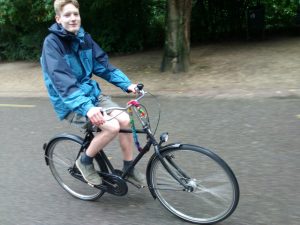
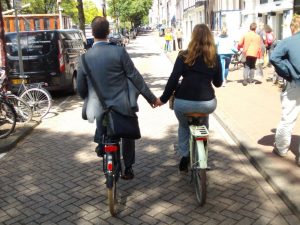
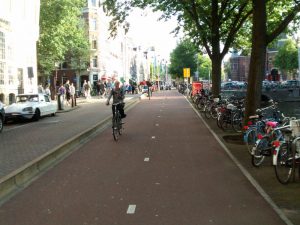
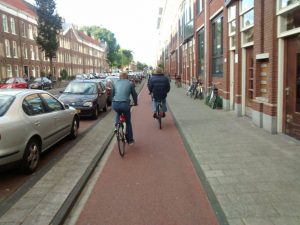
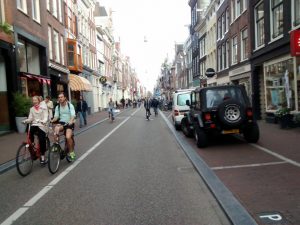
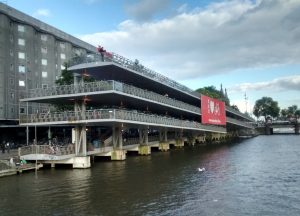
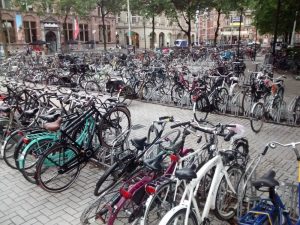
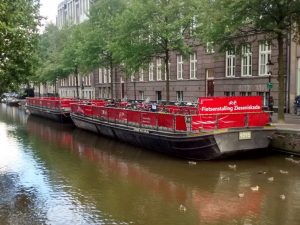
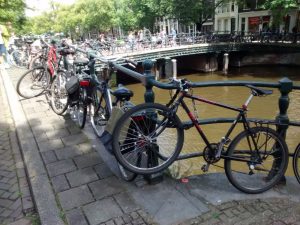
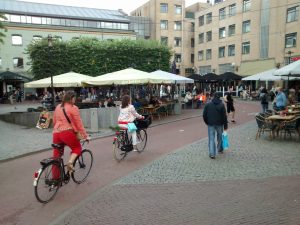
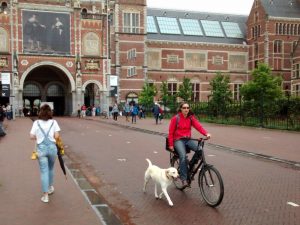
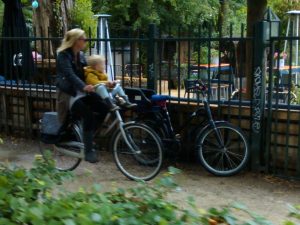
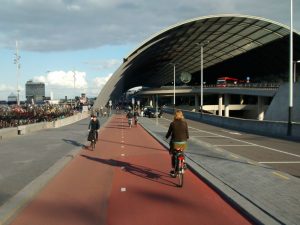
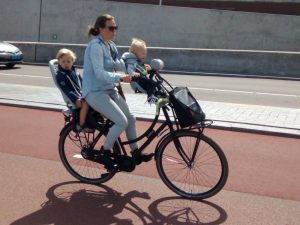

And the Amsterdam junctions! https://www.facebook.com/watch/?v=2017256394983577
Gut geschrieben. Echt toll. Danke.
We have cycled in Germany and France and have had similar experiences. the cycle paths are separate to the traffic and you feel so safe. We have also used shared pathways and had no problem with the pedestrians. it would be fantastic to have a similar cycleways in Horsham. Can we put real pressure on the new development in North Horsham to make cycling and walking a priority over cars?
The forum is very concerned about the lack of attention which has been given to pedestrians and cyclists in the plans for north of Horsham and we have put in an objection -which we will soon be posting on this website. The crossings of the A264 are the most urgent and serious issue but there are also big problems about what is (is not) promised within the development itself and for cycle links to Horsham and the surrounding area.
Please respond to the consultation on north of Horsham at: https://www.horsham.gov.uk/planning/view-and-comment-on-planning-application Reference DC/16/1677